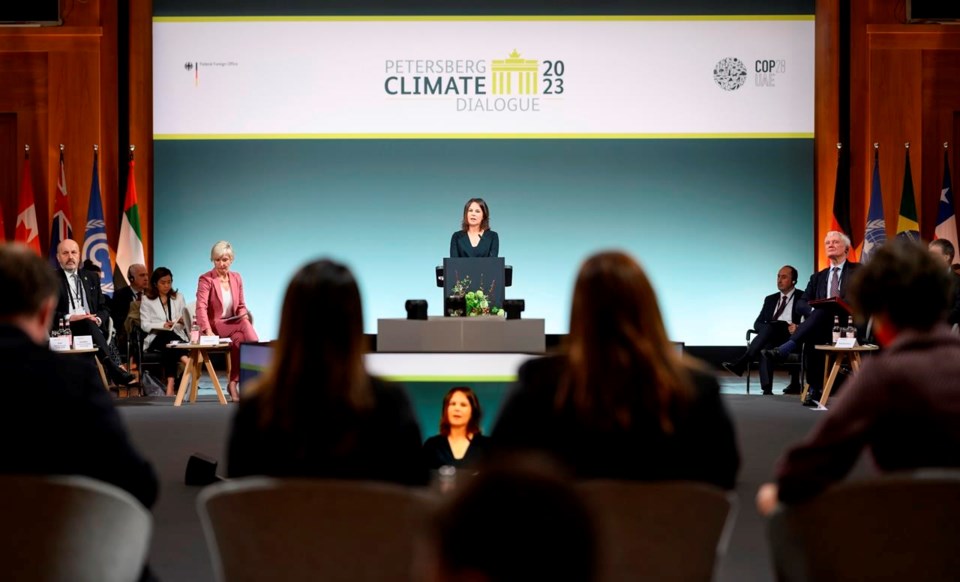BERLIN (AP) — Germany called Tuesday for governments around the world to work on setting an ambitious target for renewable energy that would “ring in the end of the fossil fuel age” and help prevent dangerous global warming.
Speaking at the start of a two-day meeting in Berlin attended by dozens of top climate envoys, German Foreign Minister Annalena Baerbock said the world needs to sharply cut greenhouse gas emissions to limit global warming to 1.5 degrees Celsius (2.7 degrees Fahrenheit).
“But we also know that not all countries are prepared to do so,” she said. “That is why I want to open the debate (...) on whether we should and can reach a target on renewables at the next climate conference.”
Baerbock's proposal flips the script on a previous push to set a deadline for phasing out all fossil fuels, which faced stiff resistance from major oil and gas exporting nations. They instead back the idea of capturing planet-warming emissions as a way to reducing greenhouse gas in the atmosphere. Experts say such technologies, known as carbon capture and storage, are aren’t proven at scale and could require huge investments at the expense of cheaper alternatives such as solar and wind power.
Addressing officials from about 40 countries attending the annual Petersberg Climate Dialogue in the German capital, Baerbock said that renewables such as solar and wind power are already the most cost-effective form of generating energy in most places around the world.
“Our goal for the (climate conference) in Dubai must be to ring in the end of the fossil fuel age,” she said.
The idea received a cool response from the United Arab Emirates, which is hosting this year’s U.N. climate summit.
“In a pragmatic, just and well-managed energy transition, we must be laser-focused on phasing out fossil fuel emissions, while phasing up and scaling up viable, affordable zero-carbon alternatives,” said Sultan al-Jaber, a minister and oil company executive who is set to preside over the Nov. 30-Dec. 12 climate summit. He placed particular emphasis on the word “emissions” as he spoke.
"We know that the energies used today will continue to be part of the global energy mix for the foreseeable future," he added. “As such, we will work with the world to decarbonize the current energy system while we build a new one, capable of transitioning even the most heavy-emitting industries.”
The UAE has invested heavily in renewable energy. Along with serving as CEO of the Abu Dhabi National Oil Co., al-Jaber is chairman of state-owned renewable energy company Masdar, which is building wind and solar parks around the world.
U.S. climate envoy John Kerry has described al-Jaber as “a terrific choice ” to chair the COP28 summit, noting his commitment to reduce emissions. Environmental campaigners are more critical, however, pointing out that the Abu Dhabi National Oil Co. is expanding production, helping make the UAE one of the world’s top 10 oil producers.
U.N. Secretary-General Antonio Guterres has called for an end to all fossil fuel use, which is blamed for the majority of global warming that has occurred since the start of the industrial era, warning that otherwise the goal of limiting temperature rise to 1.5 degrees Celsius (2.7 Fahrenheit) may be missed. But so far only coal has been put on notice, with a commitment by nations two years ago to “phase down” its use.
Environmental campaigners say solutions also need to be found for millions of workers in the coal, oil and gas industry if it is to be wound down successfully, as well as alternative sources of energy for billions of people around the world who still rely on cheap fossil fuels.
“What we need to see coming out of COP28 is not just about fossil fuel phaseout, but equitable phaseout of fossil fuels,” said Harjeet Singh, head of global political strategy at Climate Action Network International.
Diplomats attending the meeting in Berlin will also be discussing how to ramp up various forms of financial aid for developing countries hardest hit by climate change.
Baerbock said a pledge for rich nations to provide $100 billion annually to poor countries by 2020 will meet its target for the first time this year.
A separate fund to help nations hit by climate disasters, agreed at last year’s climate talks in Egypt, is still being set up.
U.S. climate envoy John Kerry has said the total amount needed to help all countries make the economic transition to a green economy will run into the trillions of dollars. Experts say that in addition to aid, large sums will need to come from the private sector. Other sources such as carbon taxes on air and sea travel have also been floated.
Pakistan's Climate Minister Sherry Rehman made clear the impatience of countries such as her own, which is still grappling with the effects of last year's devastating floods.
“We’re looking to move forward on finding paths to climate financing that is real, that is actionable, and that is delivered in time without institutionalized red tape to countries that are in need and countries that are in climate catastrophe,” she told reporters in Berlin.
___
Follow AP's coverage of the climate and environment at https://apnews.com/hub/climate-and-environment
Frank Jordans, The Associated Press



